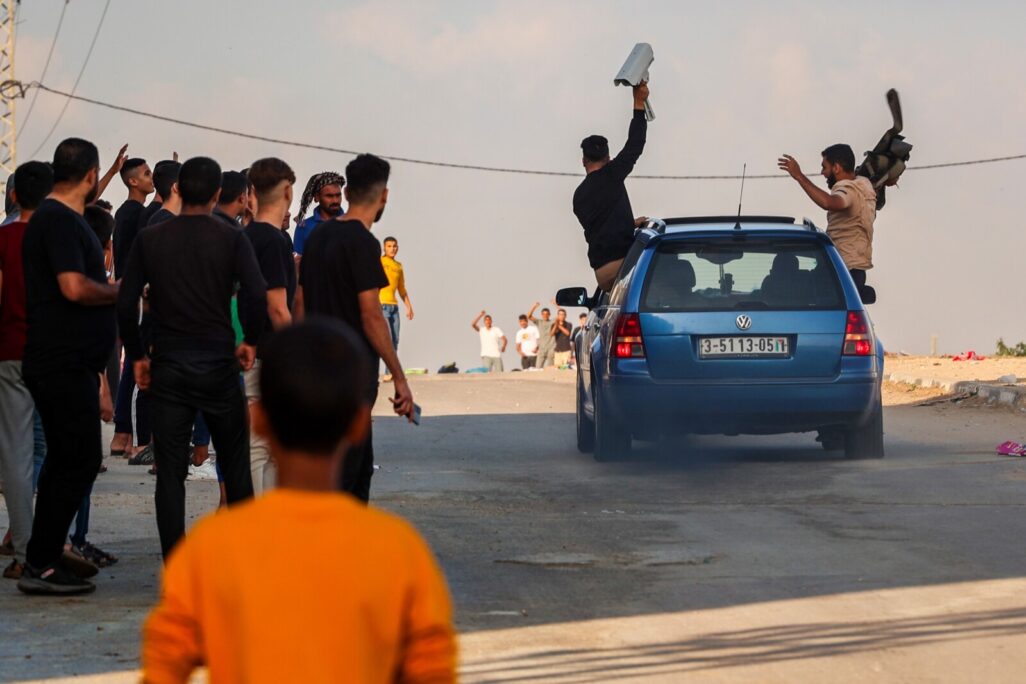
Days after Hamas' murderous surprise attack on Israel, the inevitable question arises: how did this happen?
"There was a double deception here," explained Dr. Harel Chorev-Halewa, a historian and expert on Palestinian affairs from the Moshe Dayan Center for Middle Eastern and African Studies at Tel Aviv University.
He explained that Israel held a concept where Hamas was the "responsible adult" in Gaza and the body that must be dealt with, something that turned out to be wrong after the last two operations against Islamic Jihad. In an interview with Davar, Chorev-Halewa unpacked this failed concept.
In a reality where Israel is nearing a normalization agreement with Saudi Arabia, the most powerful Muslim country in the Arab world, and is at the same time facing deep internal divisions, the attack takes place on a political background.
Chorev-Halewa spoke to Davar after the mass surprise attack, in which horrific photos were taken and distributed of terrorists laughing while shooting innocent people and desecrating the bodies of the murdered and throwing them on vans in order to kidnap them to Gaza.

Was Hamas’ attack a political action?
In my opinion, it may be on the margins, but by and large it is not. An issue like harming normalization with Saudi Arabia is a consideration, but the fact that we are counting [nearly 1,000] murdered and are not done yet—it is not Saudi Arabia, not the prisoners, not Al Aqsa that has [caused the provocation]. No one murders 900 innocent people because of normalization.
We are witnessing the fulfillment of the radical Islamic fascist vision of Hamas and the axis of resistance as a whole: a constant, non-stop pursuit of the destruction of Israel. It is a distinctly antisemitic vision and always has been, to the point that even non-Hamas Palestinians are shocked by it.
I am speaking to sources in Ramallah, who are close to the Palestinian Authority and they are simply shocked by the level of destructive antisemitism. This is not just any antisemitism, but rather the Nazi type, which strives for physical destruction and therefore sees Jews as animals, cockroaches, descendants of monkeys and pigs and so on, whose punishment and legacy is death.
Many did not understand that throughout the decades that Hamas existed. But experts who were honest with themselves, who spoke to Hamas members and read their materials, knew that this was a distinctly destructive antisemitic organization. This is the main reason for what we are seeing now—taking advantage of the opportunity, in their view, to harm Israel, in order to bring its end closer.
This is accompanied by statements heard in recent years with their own future predictions. Sheikh Bassam Jarrar, a Hamas fighter from Ramallah, predicted the end of Israel in 2022 and the Iranian leader [Ali] Khamenei predicted it would happen in 2023. They see things as simply an opportunity to promote this vision.
What are the other contexts to the attack?
It joins and intersects with several other issues. The window of opportunity is what Hamas mistakenly interpreted as the disintegration of Israeli society because of the protests. After all, it is an organization from which democracy has moved on. Hamas interpreted the protest as disintegration—they don't understand that in democratic societies, this is how it works.
They were afraid of the completion of the construction of the upper barrier in the Gaza fence, which is concrete walls. I think they were also afraid of other things, such as the development of weapons that I will not specify, which should be perfected in the coming years. So I think they took advantage of this opportunity to hit us.
Where does the issue of normalization with Saudi Arabia enter in? It’s timing that comes at a moment that could have had extensive geopolitical implications that would also affect Gaza.
The matter of Saudi Arabia is completely secondary. It is clear that [Hamas] opposes it, it is obviously an element in the considerations, but not the main element. When you ask yourself why Hamas behaved like a monster and murdered hundreds of innocent people – the only relevant answer for me is that it is a murderous antisemitic organization with a radical ideology.
It does not differ in essence from the ideology of ISIS and al-Qaeda, but differs from them only in the method. They also look to thinkers like [Muslim Brotherhood leader] Sayyid Qutb, the Salafiya Jihadiya thinkers [a more murderous version of radical Islam] and [jihadist scholar] Sheikh Abdullah Azzam, and they also see them as sources of inspiration.
Was there a thesis where we had managed to “tame” Hamas as a sovereign in Gaza as responsible for curbing the situation?
I think things are quite clear. This is a concept that has prevailed in the administration's corridors since Operation Protective Edge in 2014. Then Hamas started a war whose goal was to break the siege. From that moment, Israel began to understand it only in terms of money. We saw that Hamas does not restrain Islamic Jihad, despite the money. We also saw it before, there were preliminary signs of it—for example in the [May 2023] Operation Shield and Arrow, the last operation against Islamic Jihad.
There was a failure of the concept here. If we examine the warnings before the incident, we can see very clearly that the fear was from Hezbollah, not from Hamas. Therefore, there was a double deception here—we looked northward, while this threat rumbled from our border in the south.
Is it true that we have a lot to lose but not much to gain in this war?
I do not agree at all. Every reasonable person feels that it is impossible to live with this. Hamas should be destroyed and punished in the most severe way. They did the events of September 11 to us in multiples in relation to the Israeli population. We need to go in and clean up because all the options, even if they are vague, are of a terrorist entity of which we underestimated its danger.
Any defeatist talk about the inability to subdue Hamas is unfounded. History teaches us that organizations are able to submit, whether it is the Nazi regime, which was no worse than it as an organization in size and strength, or whether it is the Palestine Liberation Organization in Lebanon in 1982. Hamas must also be destroyed. It is true that an idea cannot be subdued, but satanic ideas always exist. The question is whether you allow them to weave more plans like we have allowed here.
If Israel fights to conquer Gaza and get rid of Hamas, what horizon does this open up?
My opinion is that, despite all the Palestinian Authority's enormous flaws, we currently do not have a better partner in the Palestinian arena. This is the default. There is nothing better. This authority—you have to remember that the depth of its hatred for Hamas is abysmal. Even the Palestinian Authority, in 2007, when it was eliminated in the Gaza Strip, couldn't believe what it—how Hamas members allegedly killed their brothers, brutalized them, shot them in the legs, executed them in the street, threw them from buildings.
Time has passed since 2007. Hasn't the hatred between the organizations subsided?
After Operation Protective Edge, I met a senior Palestinian diplomat at the level of an ambassador, and he said to me in a conversation, “You haven't finished the job.” It struck me for the first time. Since then I have learned more and more about it, how deep the gulf is between Fatah and Hamas, at the highest levels of government, how deep the hatred is for Hamas. The next time they come back to Gaza, they will not let Hamas return to what it was, they will not let it raise its head.
And what about the cost of such a deep war?
It's a terrible thing, but the method of rounds of containment did not work in our favor. We always lost more and more from round to round, and yesterday we paid the most terrible price of all. If we continue to let them live there, we will continue to pay unprecedented prices in the future. Today it is close to 1,000 dead—this is almost double the cost of the First Lebanon war. Therefore, we have no choice but to stand firm, to prepare in the face of what awaits us. These are difficult days without a doubt, but in the overall calculation it is better than the alternative of leaving Hamas standing.
What do you think of Smotrich's words in the past, according to which the PA is a burden and Hamas is an asset?
He is wrong and misleading. The split really served the Israeli concept of weakening the PA and the ability of the Palestinian entity to exist in a unified manner. I have always opposed this idea and always thought it was a failure from start to finish. I don't care that today we have to prove it, it is simply obvious.
Why attack a place as complicated as Gaza and not respond elsewhere to the allies of Hamas?
It's better to deal with everything like this separately. It's not that we don't need to deal with Iran and exact a price from it. But right now, we need to punish Hamas—not punishment for the sake of punishment, but the elimination of this terrorist entity. It's very important to do this for an—it's an unequivocal message for the resistance camp. Act against Israel and hurt us, in the end we will eliminate you and your fascist dreams. I received phone calls from Palestinian friends in Ramallah who will definitely support this.






